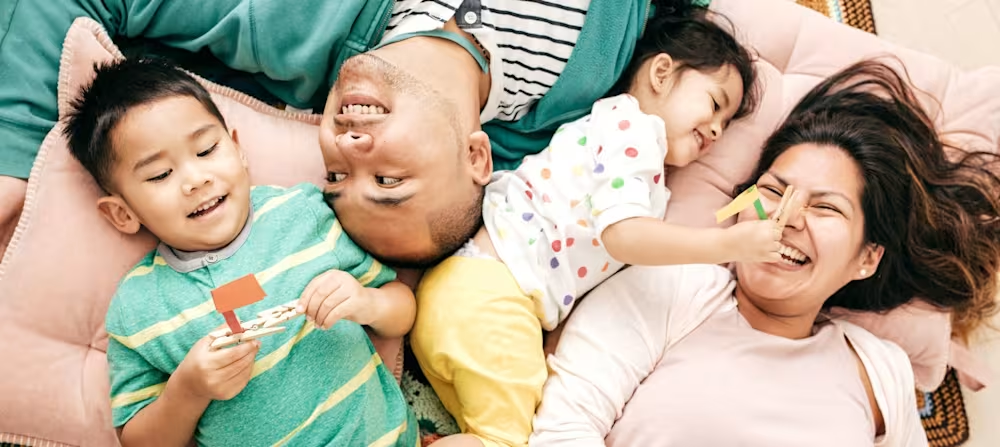7 positive parenting tips to try
Updated Aug 14, 2025

There are many challenging phases to raising a child, especially those that come with infancy and toddlerhood. Sometimes, it feels like all your energy is wasted trying to end a grocery store or getting your child dressed for a day out. While you can’t change behaviors that are developmentally appropriate for your littles, what you can do is empower yourself with the right tools and mindset to overcome these challenges and empower your children with the self-esteem and social-emotional skills they need to thrive in this world.
What is positive parenting?
Positive parenting is an approach that focuses on connection-building and the teaching of skills to prevent challenging behaviors and improve cooperation. In the positive parenting approach, the goal is to empower your child’s self-esteem through a respectful parent-child relationship.
Benefits of positive parenting
Some benefits of the positive parenting style include less stress in parents, improved child mental health, stronger parent-child relationships, more consistency between caregivers, and less harsh/inconsistent discipline practices.
7 tips for positive parenting
(Tip 1) Find quality, one-on-one moments
Children do better when they feel better. In the current fast-paced world, it is easy to find ourselves distracted with our phones or cleaning up while we spend time with our children. Carve out 10 - 15 minutes where you can spend one on one time with your child (phones not allowed). You can engage with them using a toy they like, read a board book or simply sing some songs or play games with a lot of physical touches and eye contact. By filling their emotional cup, they will feel more connected and at ease when the time comes to learn a new skill or experience correction.
(Tip 2) Involve your children in decisions
Children depend on us for pretty much the whole first year of life, but there comes a moment when they are competent to start finding their voice and unique personality. Instead of constantly telling them what to do, start asking “curiosity questions'' to help them feel involved. You can ask things like: “which book do you want to read?” or “where should we put your dirty clothes?” This will help your child discover their voice and feel in control of certain situations.
(Tip 3) Offer appropriate choices
Speaking of control, toddlers have absolutely no control over what happens to them day to day, and this can be very upsetting for them. Offer appropriate choices in different situations so that your toddler feels more in control! If getting dressed is a battle, offer two t-shirt choices and tell them they can choose. If for example, getting them to take a bath is the problem, offer two fun options for getting to the bathroom: “Do you want to hop like a bunny or gallop like a horse to the bath?”
(Tip 4) Anticipation is key! Create routines and use visual aids
Small children learn best through repetition and consistency. Make sure you have a calm and consistent routine for activities like eating and sleeping. When your child is around 15 months of age, you can begin to incorporate visual aids like a routine chart (not a reward system), that shows your child’s routine in the form of pictures. You can also incorporate visual timers in your day-to-day life to help anticipate to your child that a transition is coming (like turning the TV off).
(Tip 5) Set limits with firmness and kindness
Positive parenting encourages healthy limit setting - your little one needs limits! Make sure that you establish limits in a respectful way, and don’t mention any that you are not able to follow through with (children catch up on that very quickly). When setting a limit, you can validate your child’s emotions and remind them of what they can do. If your child is asking for a chocolate bar before dinner, you can say: “A chocolate bar is not on the menu right now. You can choose to either have an apple or a banana as a snack.” Limits that are expressed in a firm but positive way will lead to fewer power struggles and be more effective.
(Tip 6) Be your child’s emotional compass
As adults, we can regulate our emotions, but your developing child is still learning how to do this. Children have something called mirror neurons [], which perceive physical actions, facial expressions, and emotions and help the brain imitate what it sees. If you are trying to calm your child in the middle of a grocery store tantrum, the best way to do this is by remaining calm. If you react by being alarmed, your child will get the sense that there is something to be alarmed by and therefore get more upset. Model the emotional behavior that you want your child to imitate.
(Tip 7) Be aware of developmentally appropriate behavior
Be patient with your child and with yourself! Be aware of behaviors. When we have realistic expectations about our children’s behavior, parenting becomes an easier journey. For example, you can encourage your child to share, but it is important to know that they may not do it on their own for quite some time. Sharing requires practice and self-control, and this takes time.
Share article:
Note: The content on this site is for informational purposes only and should not replace medical advice from your doctor, pediatrician, or medical professional. If you have questions or concerns, you should contact a medical professional.
3 Sources
Share article:









